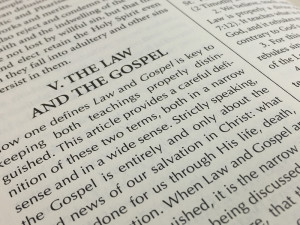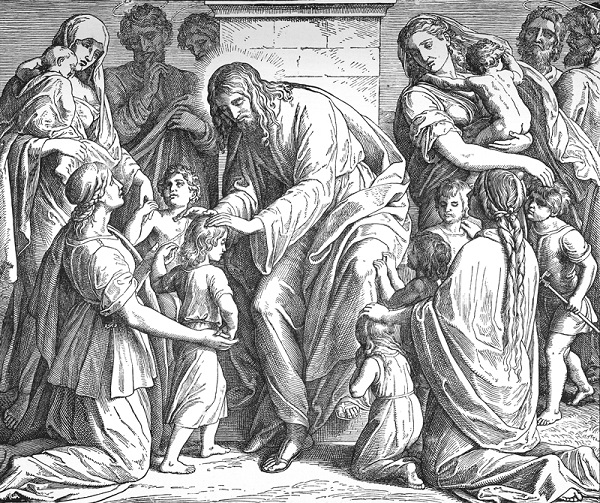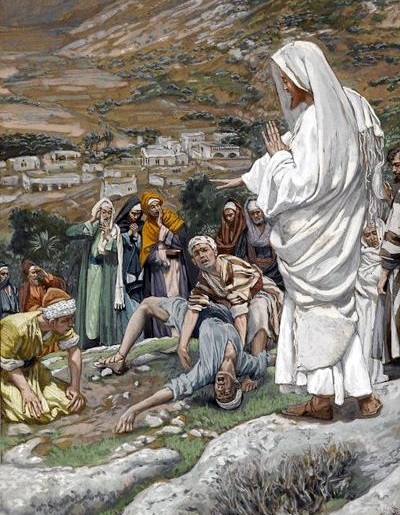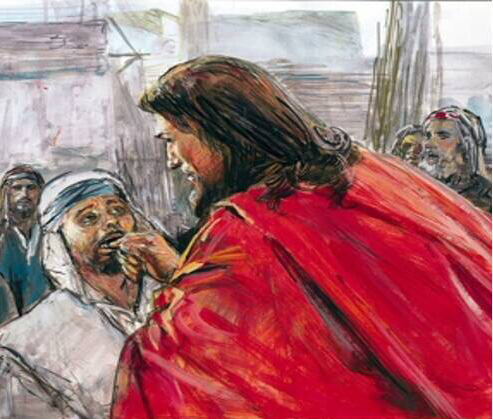+ Holy Baptism of Blair Elouise Rosenbaum +
Readings: Numbers 11:4–6, 10–16, 24–29 | James 5:1–20 | Mark 9:38–50
Text: Mark 9:38-50
(covering points of Formula of Concord, Article V – Law and Gospel)
38 John said to him, “Teacher, we saw someone casting out demons in your name, and we tried to stop him, because he was not following us.”
Imagine for a moment what the church, pictured by Jesus disciples, would be if they had their way. Call it the “Church of the Twelve.” There would be an emphasis on who has the authority. Power and permission would flow through them, the gatekeepers. There might be tiers of membership, because after all you have to tell who’s the greatest somehow. Decisions would flow from the top down, and people would be obligated, if not compelled, to conform.

Within the Church of Twelve, there would be certain standards for members to maintain. If you didn’t meet the “community standards,” you would face discipline and exclusion. If someone were to upset the order with dissension, those in authority would have to evaluate if they were still an asset or a detriment to the community. They would deem it necessary to lose one or two or a few, for the sake of preserving the whole.
Thank God in heaven that Jesus crushes the disciples plans for the Church. But as these tendencies arise from our sinful flesh, they still make their way in at times. Even at the Church at Corinth in the 50’s AD, there was already a party spirit growing, “each one of you says, ‘I follow Paul,’ or ‘I follow Apollos,’ or ‘I follow Cephas,’ or ‘I follow Christ.’” (1 Cor. 1:12) This had also begun to divide the weak from the strong over knowledge about meat offered to idols and who got to take the Lord’s Supper.
At various times this has continued, fueled by a focus not on the things of God, but on the things of man—of personalities, and numbers of followers. Former Presbyterian minister, Barton Stone, once wrote, “Partyism is a foul blot on Christianity, and among the blackest stains on the character of its professors. An apostle calls such ‘carnal.’ Partyism is directly opposed to the plan of Heaven, which is to gather into one, or unite all, in Christ Jesus.”[1]
So what is most important to the Lord Jesus for His Church?
39 But Jesus said, “Do not stop him, for no one who does a mighty work in my name will be able soon afterward to speak evil of me. 40 For the one who is not against us is for us. 41 For truly, I say to you, whoever gives you a cup of water to drink because you belong to Christ will by no means lose his reward.
Let’s pull back to why Jesus came to earth, and what the goal of the Kingdom of God is. Is it not because the world is under the domination of Satan, and that men and women are held captive by sin and death? And did Jesus not come to break the unchallenged rule of Satan and to free the captives? So, tell me again what happened? Demons were being cast out in Jesus’ Name. If that’s what was happening, why did you want to stop that? And do you remember how you were not able to cast out that demon in the father’s son? (Mark 9:14-29) So it’s the goal that people believe in Jesus Christ and receive His victory over devil, sin, and death? Yes, this is good.

It would be even better if all those who have faith in Jesus’ Name would join together and not walk apart from each other. Barton Stone, who was instrumental in the Church of Christ movement, had the right idea, but it didn’t work out. We have at least two things that prevent genuine unity in the Church on earth. Our old Adam is a hopeless partisan. The voice of Moses echoes, “Are you jealous for my sake?” (Num. 11:29). Besides, Satan himself twists the Word of God so that we are bent on following all sorts of strange doctrines and partial truths.
Our current setting in the world is also no help either, because it conditions us in the art of demonization. By use of distance/isolation, slogans, and labels, we’ve found ways to pigeon-hole others and not even bother to take the time to have a civil, face-to-face conversation. Based on what political party you follow, what’s your vaccine status, or even your outward appearance, we judge others and are judged. I’m telling you this not to raise your blood pressure, but so that you see how easily we fall into parties, and how quickly that takes the focus of the goals of God’s Kingdom.
The most important thing to Jesus is salvation for all who believe in His Name. This faith is God’s work by His Spirit: “I believe that…the Holy Spirit has called me by the Gospel, enlightened me with His gifts, sanctified, and kept me in the true faith. In the same way, He calls, gathers, enlightens, and sanctifies the whole Christian Church on earth and keeps it with Jesus Christ in the one, true, faith.” What’s more, God doesn’t respect personalities when He does His work. To prove this point, He even once opened the mouth of a donkey (Numbers 22:22-33). Whether it is a mighty work, or something as simple as giving a cup of water because someone belongs to Christ, what truly matters is faith in the heart, which shows the Kingdom of God has come near.
The same is true inside the congregation, where those who do follow Jesus together, are gathered:
42 “Whoever causes one of these little ones who believe in me to sin, it would be better for him if a great millstone were hung around his neck and he were thrown into the sea. 43 And if your hand causes you to sin, cut it off. It is better for you to enter life crippled than with two hands to go to hell, to the unquenchable fire. 45 And if your foot causes you to sin, cut it off. It is better for you to enter life lame than with two feet to be thrown into hell. 47 And if your eye causes you to sin, tear it out. It is better for you to enter the kingdom of God with one eye than with two eyes to be thrown into hell, 48 ‘where their worm does not die and the fire is not quenched.’

Jesus prizes the gift of faith and people being welcomed and kept in His Kingdom. He speaks about things that “cause to sin,” which is the Greek word for scandalize or cause to stumble. That comes from the image of following Jesus, walking along The Way (the first name for New Testament Church, Acts 24:14) So, to make a follower of Jesus stumble is to endanger their faith and all that comes from it.
To illustrate how important this is to Jesus, remember last September, during the fires, when some places we live were under Level 2 for evacuation. At that point, you were supposed to have your car packed with whatever was most precious and essential. Come Level 3, anything else could burn, and you’d get by. Picture that now with what Jesus is saying about the faith of His little ones. The faith of even the least of His brothers is so precious to Him that everything else can go, so that no soul may be lost.
The Church of the Twelve would see fit to cast out the problem cases, or cast out those who can’t “pull their weight”. They would get rid of the least, the fussy children, those who simply bring their family to church, or the infirm who can’t do anything like they used to. But Jesus turns that around to say what really needs to be cut off is whatever endangers faith. No matter how precious it is, whether hand, foot, or eye, if it causes you or others to stumble, then that is what is expendable. It would be better to lose that, than to lose a whole person to the eternal fires of hell.
With such a treasure as faith is to our Lord Jesus, we had also better know how that faith is properly nurtured. That is by properly handling the word of truth, as St. Paul urges Timothy, “Do your best to present yourself to God as one approved, a worker who has no need to be ashamed, rightly handling the word of truth.” (2 Tim. 2:15) Rightly handling the Word of truth is crucial to cultivating that saving faith. What I mean by that is properly distinguishing between the Law and the Gospel, “the distinction between Law and Gospel is an especially glorious light that is to be maintained with great diligence in the church.” (Formula of Concord Epitome V, 2) The Law is “a divine doctrine which teaches what is right and God-pleasing and which condemns everything that is sinful and contrary to God’s will.” (FC Ep. V, 3) and the Gospel is “teaches what a man who has not kept the law and is condemned by it should believe, namely, that Christ has satisfied and paid for all guilt and without man’s merit has obtained and won for him forgiveness of sins, the ‘righteousness that avails before God,’ and eternal life.” (FC Ep. V 5)

It’s dangerous to faith when Law and Gospel are confused—when the person who feels godly sorrow for his sin is condemned for not trying harder; and when the erring are given a free pass. This confusion causes great damage because it results in proud Christians who think sin is no big deal, and despairing souls who think they could never be saved. What a terrible outcome! So the Lord gives His Word, and His preachers to carefully apply His Word to His little ones, whose life is so precious to Him.
He concludes today’s reading with the admonition, “49 For everyone will be salted with fire. 50 Salt is good, but if the salt has lost its saltiness, how will you make it salty again? Have salt in yourselves, and be at peace with one another.”
Have salt in yourselves means that our Lord wills us to be the community of the saved. The Church is not your school or workplace, where it depends on popularity or who you know. It’s not a social club that you belong to sometimes, and join in based on your convenience and availability. As I mentioned before, the whole purpose of the Church is to be the place where the Kingdom of God breaks into the dominion of Satan, freeing men from their bondage to sin and death. Where the Church is doing that, she follows in the steps of the Son of God Himself.
Make peace with each other, indeed with all who the Lord has called in His Name. Whether they are small or great, well-taught or needing guidance, be at peace as God has made peace with us by the Name of Jesus Christ.
God’s intended goal is to give sinners life. Cast out demons, rescue, raise from the dead, redeem from the curse of the Law. All this comes to you in the Name of Jesus, in which we gather, into which we are baptized, in which we call upon Him as beloved children, in which He gathers us to eat and drink, and the Name by which He puts on us as we depart from this place.
In this, we are salted to live sacrificial lives and make peace with each other, as the Lord has made peace with us. And then He sends out by the powerful peace-making work of His Name: “The Lord make His face to shine upon you, and give you peace.” Peace be with you, in that powerful, saving, glorious Name of Jesus. Amen.

[1] “An Address to the Churches” (1818)





















